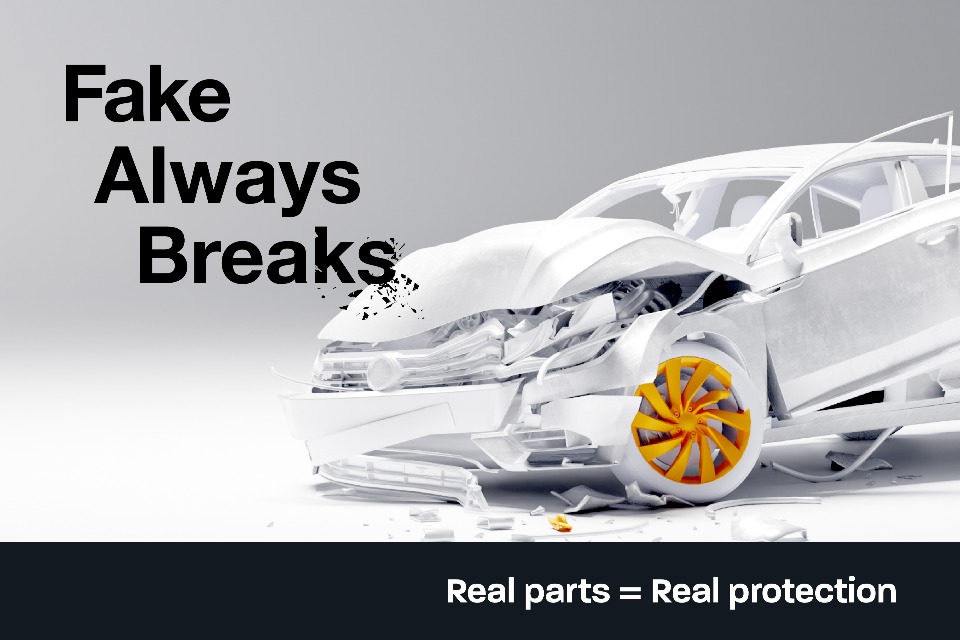Business guidance fake parts
Updated 18 October 2024

Introduction
This guidance has been developed in collaboration with the motor industry to help you avoid selling / installing fake parts and report counterfeit sellers.
Fake or sub-standard vehicle parts are often cheap-looking imitations, but telling the difference between fake and genuine products can be challenging. These counterfeit parts are usually made with inferior materials, making them more likely to fail. This can lead to serious risks for drivers, passengers, and other road users.
Selling fake parts is not a victimless crime. These products can contribute to road accidents endangering lives. The money made from fake goods is often used to fund other serious crimes like drugs, child exploitation and prostitution.
Many consumers are unaware of the risk fake parts pose and the dangers to drivers, passengers and other road users when fitted to a vehicle.
Car and parts manufacturers are working hard to stop fake parts from entering the UK market. As well as removing those that slip through the net from online and offline outlets.
Garages also play a vital role in the fight against fakes parts, and their vigilance is essential in keeping dangerous products off the road.
1. How big is the problem?
Fake parts are a global issue, with seizures happening on a regular basis worldwide. OECD research estimated that, in 2016 alone, vehicle and motorcycle sector counterfeits imported to the UK were worth almost £1billion[footnote 1].
Common fake parts include filters, brake pads and discs, spark plugs, lighting, alloy wheels, suspension components and air bags. These are critical parts that can cause serious damage to the vehicle and accidents if they fail.
2. Fake parts: Are they dangerous?
The danger of fake vehicle parts cannot be overstated. To illustrate this, the motor industry has produced the following videos that show the risks.
Toyota genuine parts / oil filter comparison
The video compares the efficiency and construction of a genuine and counterfeit oil filter, focusing on durability and performance.
https://www.youtube.com/watch?v=j15x1umneYI
Mercedes Benz / Holden counterfeit wheel pothole test cracking
This video demonstrates what happens when counterfeit wheels are driven into a pothole and the wheel cracking and falling apart upon impact.
https://www.youtube.com/watch?v=rL193Q7bOT0
BMW Group Brand Protection – product comparison original Vs fake
Comparing the quality and efficiency of genuine and counterfeit brake pads and the startling difference in stopping distances.
https://www.youtube.com/watch?v=b9HaNqlMkoo
Toyota- genuine vs counterfeit (airbag)
Airbags are a key safety feature in an accident, but can you rely on a counterfeit airbag to activate when you need it?
https://www.youtube.com/watch?v=iSEvXtI2yso
3. The supply chain
The global supply chain is a complex business. New and upgraded parts regularly come to the market in response to new technologies, materials and regulations.
However, criminals will always try to disrupt a legitimate business regardless of its complexity with ‘one size fits all’ product approach. It’s important to remember, fake always breaks.
4. Customer supplied vehicle parts
As a garage owner, you may encounter customers looking to save money by bringing in their own vehicle parts for you to install. While it may seem like a reasonable request, can you be sure of the authenticity of the part?
Fitting parts from unknown sources can put both the driver and your team at risk. Counterfeit parts can easily fail, leading to accidents, and this can cause liabilities for your garage.
It is also important to explain to customers that many garages, including those in the Trust my Garage Scheme and reputable independent garages, carefully select and fit only genuine parts. This not only ensures the safety of the vehicle, but also gives customers peace of mind, knowing that parts installed meet the required standards.
5. How to check if a vehicle part is fake?
Car and parts manufacturers have developed tools and methods to verify the authenticity of their products. However, criminals operate outside these systems, making detection and prevention difficult.
Many manufacturers have digital tools that allow you to check online or via an app. Examples include:
If you’re a car or parts manufacturer, have digital resources to assist maintenance garages to identify fake parts and wish to add them here, email enforcement@ipo.gov.uk.
6. Reporting suspicious fake vehicle parts
Why is it important?
If you order a part and suspect it could be fake before or after fitting, Take photographs of the part, packaging and labels and report it. This is regardless of whether you return it to the supplier for a refund.
Your report matters and could lead to more dangerous parts being removed from the market, making our roads safer for everyone.
7. Where to report fake vehicle parts?
There are different ways to report fake parts so it can be investigated.
Car manufactures
Most, if not all car manufacturers, will have brand protection teams that pursue fake vehicle parts.
Alfa Romeo: brandprotection@stellantis.com
Audi: brandprotection@audi.de
Abarth: brandprotection@stellantis.com
Bentley: brandprotection @bentley.co.uk
BMW/Mini: brand.protection@bmw.com
Chrysler: brandprotection@stellantis.com
Citroen: brandprotection@stellantis.com
DS: brandprotection@stellantis.com
Dodge: brandprotection@stellantis.com
Fiat: brandprotection@stellantis.com
Ford: Bprotect @ford.com
Honda: brand.protection @honda-eu.com
Iveco: brand-protection @cnhind.com
JEEP: brandprotection@stellantis.com
Kia/Hyundai: brand-protection@gmobis.com
Lancia: brandprotection@stellantis.com
Lamborghini: brandprotection@lamborghini.com
Land Rover/Jaguar: bprotec1@jaguarlandrover.com
Maserati: brandprotection@stellantis.com
Mercedes Benz: dialog@mercedes-benz.com
Opel: brandprotection@stellantis.com
Peugeot: brandprotection@stellantis.com
RAM: brandprotection@stellantis.com
Renault/Dacia/Alpine: Renaultgroupbrandprotection@renault.com
Scania: brandprotection@scania.com
Seat: brandprotection @seat.es
Skoda: brand.protection@skoda-auto.cz
Toyota: brandprotection @toyota-europe.com
Vauxhall: brandprotection@stellantis.com
Volkswagen: brandprotection @volkswagen.de
Aftermarket parts manufacturers
Mahle: original@mahle.com
Bosch: info.protect@bosch.com
Schaeffler: piracy@schaeffler.com
ZF: counterfeit.zf-aftermarket@zf.com
If you are a car or parts manufacturer and would like your email address added to this list, email enforcement@ipo.gov.uk.
Law enforcement:
Report to Trading standards website using your postcode. Some local authorities may redirect you to the Citizens Advice reporting system.
If you wish to remain anonymous report via the Crimestoppers website or call 0800 702 2020.
-
Trade in Counterfeit Products and the UK Economy, 2019 Update ↩
